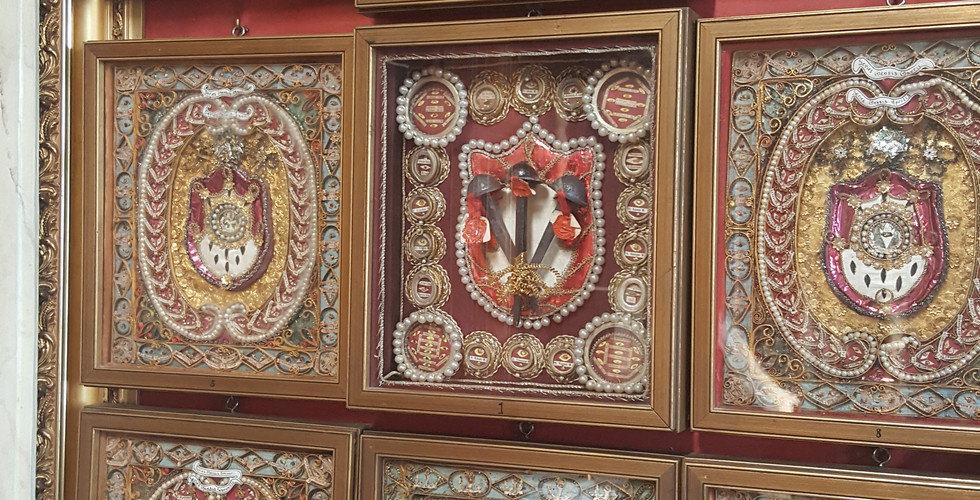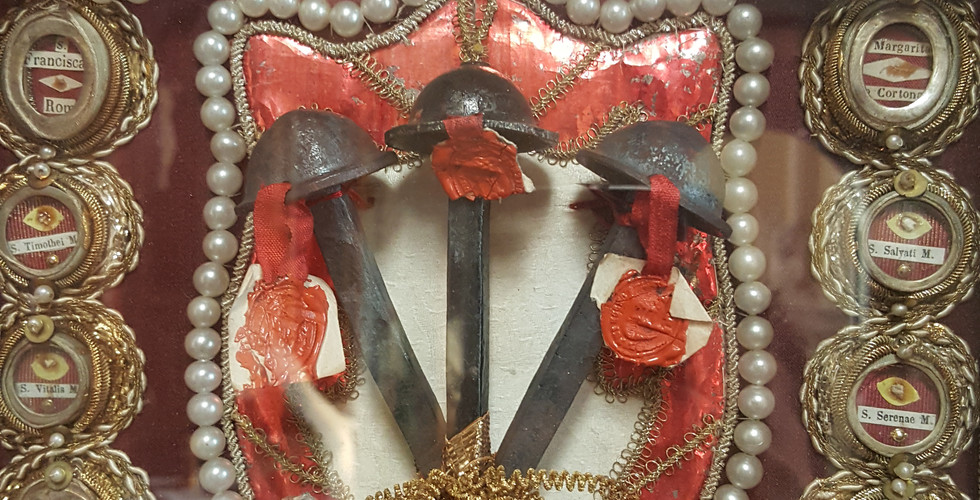Exodus 90 - Day 50
- Father David Mowry

- Mar 2, 2020
- 4 min read

This week I’m in St. Louis for a week of intensive classes as part of my ongoing studies in homiletics. That means a week out of my usual routine. What I can normally do on autopilot (get up, suffer a cold shower, pray a holy hour, etc.) now requires extra thought and attention. When will I get up? How does this shower work? How much time do I have for prayer? All the little things I took for granted remind me how much work this asceticism is. Frustratingly, life continues to happen even while this Exodus 90 thing goes on! I hadn’t realized how much I had internalized the disciplines of the program until I’ve been thrown into a new situation. In a way, I think that’s good news for two reasons. For one, it means that the fasting and prayer are not something that I look for an opportunity to drop when things get a little inconvenient. It would be easy to make excuses while traveling. It’s something I do all the time! “Well,” I tell myself, “there’s nothing wrong with having dessert twice today. I’m away from home. I should treat myself. I need to feel comfortable. Sure another glass of wine wouldn’t hurt.” And so on and so on. On this trip, I’ve had passing thoughts along those lines but they don’t tempt me the same way as before. What’s more important to me is not feeling comfortable but rather staying consistent in my habits.
The second reason I’m encouraged comes as a surprise to me. I actually want to find time in my changed schedule for all the disciplines of Exodus 90. For example, men in the program commit to regular exercise during the week. I’m staying in one of the motherhouses of the Sisters of St. Joseph (more on that later) and for some reason, when the sisters built the place in the 1890s they did not prioritize a weight room! How those sisters made their gains and pumped iron I don’t know. Furthermore, the neighborhood around the motherhouse has gotten dangerous since they built the place a century ago, making walking or running during my free evenings highly inadvisable. In the past, facing the idea of week without proper exercise facilities would cause me to give up on exercising at all. This time, thanks to the habits formed by Exodus 90, I did some research on intense exercises that could be done with minimal equipment. For the first time I can recall, I’ve had a habit I wanted to keep so much that I was willing to put in the effort to be flexible even when I’m out of my usual routine. I’ve felt the same resolve when it comes to dessert or alcohol or even the cold showers. It’s a sign of the strength of will that God has built up in me through these first fifty days. I’m not surprised – all this spiritual exercise was bound to build up some inner strength eventually!
Now while the sisters didn’t find space for a physical gym in their convent, they do have an Olympic level spiritual gym. I cannot do justice to the beauty of their main chapel. It’s a real pleasure to be able to pray there early in the morning while I’m away from my usual routine. And whenever I pray there, I’m not alone. The chapel in the motherhouse has one of the largest collections of relics of saints in the United States. Relics are the remains of saints or objects associated with them. Catholics honor and venerate these not because they have magic powers but rather because they serve as tangible connections with those who were fully united with Jesus. In the end that union is the goal of every Christian, and the relics serve as a physical way for us to be connected with those who lived the fullness of the Christian life.
Reverend Mother St. John Facemaz and Reverend Mother Agatha Guthrie secured relics from Rome and elsewhere to put in the chapels of the Sisters of St. Joseph in order to promote their sisters’ growth in holiness and union with Jesus. An entire side altar in the main chapel of the motherhouse stands as a testament to the faith and perseverance of the early martyrs of the Church. The altar holds the relics of St. Neusia Euticia, a young noblewoman from the second century; St. Berisimus, who was killed in the Colosseum during the reign of Antoninus Pius; St. Berenice, who died at the age of 10; St. Discolius, another child martyr; and Sts. Vincent and Aurelius, two soldiers of the Roman Empire who died rather than deny the faith. The side altar houses the relics of a further seventy martyrs of the early church.

This chapel is a spiritual powerhouse! I love saying Mass and praying here. The martyrs inspire me as a preacher. They gave such eloquent witness to Jesus by their readiness to lay down their lives in imitation of His own self-sacrifice. I always like to think I would be able to take the same brave stand, but in all honesty, I’m too much of a wimp. There are times when I have to gin up courage just to get into the ambo to preach. But my weakness just makes me love the martyrs more. I look to them for support and encouragement while I try to figure out how I can witness to Christ and live in a deeper union with Him. The holy martyrs challenge me during Exodus 90 as well. I’m not facing life or death whenever I come across a plate of cookies, but I feel like no one has suffered like I do when I have to pass on dessert. The martyrs endured real self-sacrifice. They had the right attitude of detachment at that moment when they faced death. It’s that detachment that I hope to cultivate in myself and in my Exodus 90 fraternity as we go through the last forty days of this ascetic exercise.
In addition to your prayers for me and my Exodus 90 fraternity, I also ask for you to pray for all of my classmates in my homiletics class. We are going through the entire history of Christian preaching this week, and it turns out there were a lot of homilies given in the last 2000 years! Pray that we can be focused enough to glean wisdom from the master preachers who have been witnesses to the Gospel up and down the centuries.
All you holy martyrs, pray for us!
St. Josemaría Escrivá, pray for us!



















Comments